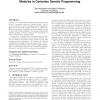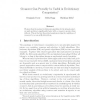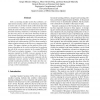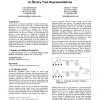148
click to vote
EC
2006
15 years 2 months ago
2006
Learning Classifier Systems (LCSs), such as the accuracy-based XCS, evolve distributed problem solutions represented by a population of rules. During evolution, features are speci...
103
click to vote
CORR
2008
Springer
15 years 2 months ago
2008
Springer
This paper describes a Genetic Algorithms approach to a manpower-scheduling problem arising at a major UK hospital. Although Genetic Algorithms have been successfully used for sim...
139
click to vote
GECCO
2008
Springer
15 years 3 months ago
2008
Springer
The choice of an appropriate hardware representation model is key to successful evolution of digital circuits. One of the most popular models is cartesian genetic programming, whi...
GECCO
2008
Springer
15 years 3 months ago
2008
Springer
We show that the natural evolutionary algorithm for the all-pairs shortest path problem is significantly faster with a crossover operator than without. This is the first theoret...
170
click to vote
FOGA
1998
15 years 3 months ago
1998
Genetic algorithms (GAs) are multi-dimensional and stochastic search methods, involving complex interactions among their parameters. For last two decades, researchers have been tr...
121
click to vote
HIS
2008
15 years 3 months ago
2008
XCS is a learning classifier system that combines a reinforcement learning scheme with evolutionary algorithms to evolve rule sets on-line by means of the interaction with an envi...
134
Voted
GECCO
2006
Springer
15 years 5 months ago
2006
Springer
In some cases, evolutionary algorithms represent individuals as typical binary trees with n leaves and n-1 internal nodes. When designing a crossover operator for a particular rep...
103
Voted
GECCO
2006
Springer
15 years 5 months ago
2006
Springer
Recently, studies with the XCS classifier system on Boolean functions have shown that in certain types of functions simple crossover operators can lead to disruption and, conseque...
141
click to vote
ASIAN
2004
Springer
15 years 5 months ago
2004
Springer
This paper presents a line of research in genetic algorithms (GAs), called building-block identification. The building blocks (BBs) are common structures inferred from a set of sol...
111
click to vote
EPS
1998
Springer
15 years 6 months ago
1998
Springer
This paperpresentsa new approachto the evolutionof neuralnetworks. A linear chromosome combined with a grid-based representation of the network and a new crossover operator allow t...





